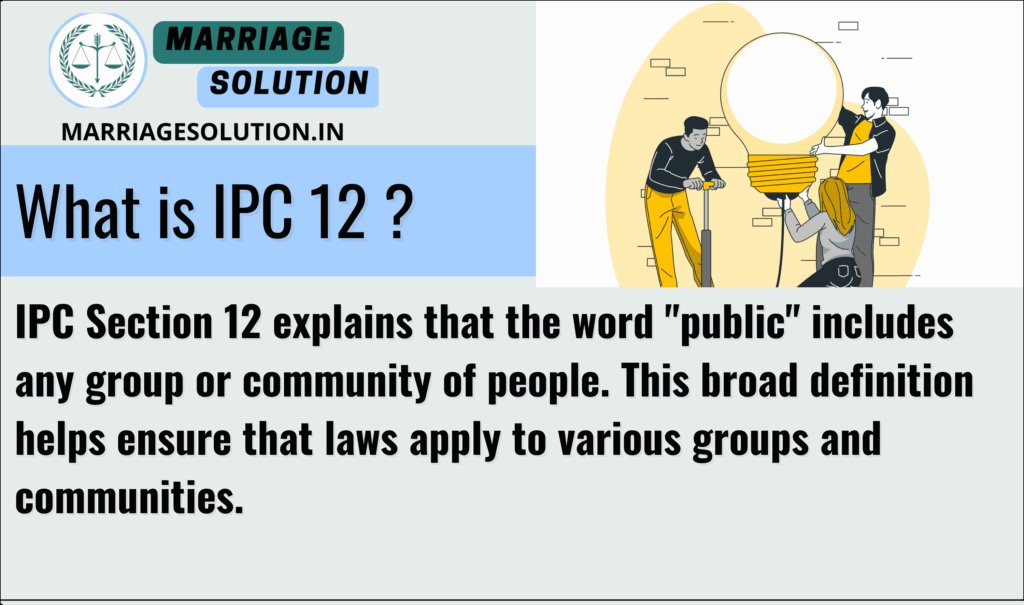Introduction of IPC Section 12
The Indian Penal Code (IPC) is the backbone of criminal law in India. IPC Section 12 defines the term “public” as used within the code, which is crucial for understanding various legal provisions.
What is IPC Section 12 ?
IPC Section 12 explains that the word “public” includes any group or community of people. This broad definition helps ensure that laws apply to various groups and communities.

IPC Section 12 Overview
IPC Section 12 explains that the word “public” includes any class of the public or any community. This definition helps in interpreting the term “public” broadly, ensuring that laws apply to different groups and communities as necessary.
Key Points Explained
- Inclusive Definition:
- The term “public” includes any class or community of the public.
- This broad definition ensures that the law can be applied to various groups of people, not just individuals.
- Legal Clarity:
- Provides a clear understanding for legal proceedings.
- By defining “public” broadly, IPC Section 12 removes ambiguity in legal texts and proceedings.
- Application to Groups:
- Includes different classes and communities within the public.
- This means that laws referring to the public can be applied to specific groups or communities as needed.
- Contextual Interpretation:
- Helps in interpreting legal terms in context.
- Judges and lawyers can use this definition to ensure that the term “public” is understood correctly in various legal contexts.
- Consistency in Law:
- Ensures consistency across various laws and legal documents.
- The broad definition of “public” helps maintain uniformity in legal interpretations.
- Judicial Interpretation:
- Courts use this definition to interpret the law.
- Judges refer to IPC Section 12 to ensure that their rulings are inclusive of all groups defined as “public.”
IPC 12 Punishment
IPC Section 12 itself does not prescribe any specific punishment. It serves as a guideline for interpreting the term “public” within legal contexts. Therefore, there are no punishments associated with this section.
12 IPC bailable or not ?
Since IPC Section 12 is a definitional section and does not outline any offenses, the question of bail does not apply.
Section 12 IPC in short information
| Aspect | Details |
|---|---|
| Definition | IPC Section 12 defines “public” as including any group or community of people. This helps in applying laws to different groups. |
| Offense | IPC Section 12 does not describe any specific offenses. It only defines the term “public.” |
| Punishment | There are no punishments under IPC Section 12 since it is just a definition section and does not involve any criminal actions. |
| Bailable or Not | Bail is not applicable to IPC Section 12 as it does not deal with any offenses or punishments. |
IPC Section 12
What does IPC Section 12 define?
IPC Section 12 says that “public” includes any group or community of people. This makes sure that the law covers all groups, not just individuals.
What is Punishment under IPC Section 12 ?
IPC Section 12 itself does not prescribe any specific punishment. It serves as a guideline for interpreting the term “public” within legal contexts. Therefore, there are no punishments associated with this section.
IPC 12 Bailable or Not?
Since IPC Section 12 is a definitional section and does not outline any offenses, the question of bail does not apply.
If you need support with court proceedings or any other legal matters, don’t hesitate to reach out for assistance.
Court or any other marriage-related issues, our https://marriagesolution.in/lawyer-help-1/ website may prove helpful. By completing our enquiry form and submitting it online, we can provide customized guidance to navigate through the process effectively. Don’t hesitate to contact us for personalized solutions; we are here to assist you whenever necessary!
